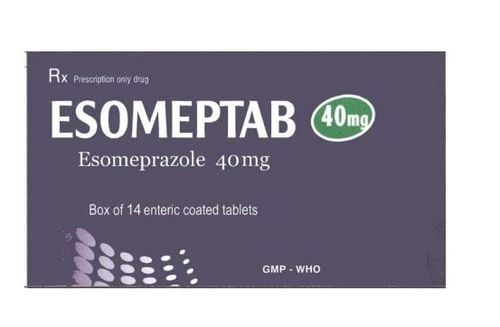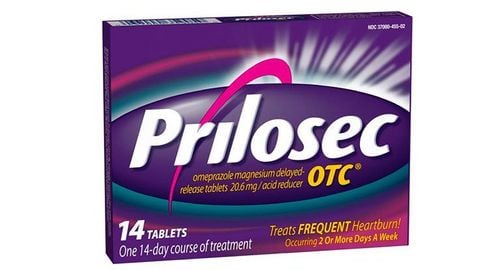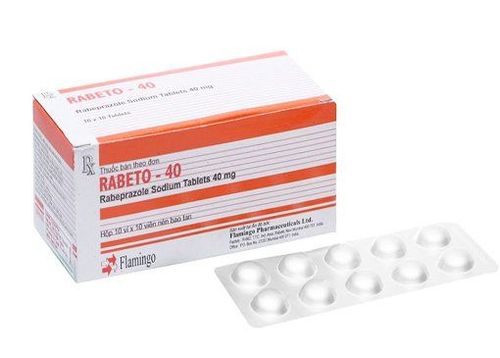This is an automatically translated article.
Aphacolin 40mg is commonly known to treat some stomach and esophageal problems. The use of Aphacolin analogues has become increasingly popular due to the increasing incidence of peptic ulcer disease. Understanding the uses, usage and some side effects of the drug will help you use Aphacolin safely and effectively.
1. How does Aphacolin 40mg work?
Aphacolin 40mg is an oral medicine commonly used for diseases of the gastrointestinal tract, which is prepared in the form of hard capsules containing enteric coated granules. Ingredients in each tablet Aphacolin 40 include: Esomeprazole 40 mg and and some other excipients just enough. The Esomeprazole ingredient in Aphacolin 40 belongs to the class of proton pump inhibitors, which reduce the amount of acid your stomach makes. It works by blocking the proton pump in the cells of the stomach. When the proton pump is blocked, the stomach will produce less acid, the damage caused by acid in the stomach and esophagus gradually heals, preventing the formation of new ulcers in the stomach and lesions in the esophagus.
2. In what cases is Aphacolin 40mg used?
Aphacolin is used to treat the symptoms and certain conditions associated with gastroesophageal reflux disease (GERD), such as: esophagitis caused by reflux of stomach acid, to prevent recurrence in patients with esophagitis. management has healed; Diseases associated with excessive gastric acid secretion such as Zollinger-Ellison syndrome; Treatment of peptic ulcers that are benign or caused by the use of NSAIDs; Use in appropriate antibacterial regimens to eradicate H. pylori and treat peptic ulcers caused by this bacterium; Prevention of peptic ulcers caused by Helicobacter pylori bacteria or by the use of non-steroidal anti-inflammatory drugs (NSAIDs)
3. How to use Aphacolin 40?
Dosage of Aphacolin for adults and children over 12 years old:
With severe gastroesophageal reflux disease (GERD) or GERD with erosive esophagitis, 40mg daily for 4 weeks, can be extended for another 4 weeks. necessary. Alternatively, take a starting dose of 20 mg or 40 mg of Esomeprazole for 4 to 8 weeks, if the lesion has not healed, it can be taken for another 4 to 8 weeks. In severe cases, the daily dose may be increased to 80 mg in 2 divided doses. Maintenance therapy to prevent recurrence after resolution of esophagitis or symptomatic treatment in GERD without esophagitis once daily 20mg Esomepazol. Treatment of peptic ulcers caused by H.pylori, take Esomeprazole 20 mg each time, 2 times a day for 7 days, or 40 mg once a day for 10 days depending on the regimen and indications of the doctor. Treatment of NSAID-induced peptic ulcer or stress ulcer prophylaxis: 20 mg daily for 4 to 8 weeks. Prophylaxis of duodenal ulcer in persons at high risk of gastric and duodenal complications, but requiring continued NSAID therapy: 40 mg or 20 mg daily Esomeprazole Zollinger-Ellison syndrome: initiation Start treatment with 40 mg twice daily, then adjust the dose if necessary. In patients with severe hepatic impairment consider a dose not exceeding 20 mg per day. In children under 12 years of age, the dose of Esomeprazole is indicated according to age and weight, but the dose is usually low, so other products containing Esomeprazole with lower concentrations can be selected to facilitate the use of the drug. . Aphacolin should be taken whole with a full glass of water, at least 1 hour before meals. Do not chew, crush or break the tablet. Breaking the tablet of Aphacolin can degrade the active ingredient in the drug when it reaches the stomach, so if you have to use the drug with concentrations lower than 40mg, doctors will consider choosing other more suitable drugs.
Continue to use Aphacolin for the full prescribed length of time, even if your symptoms have improved rapidly.
Do not use Aphacolin if you:
Have ever had kidney problems, breathing problems or severe allergies when using drugs or other medicines containing Esomeprazole. There is a history of allergy to Esomeprazole and to similar drugs such as Lansoprazole, Omeprazole, Pantoprazole,... Caution should be exercised when using Aphacolin for pregnant or lactating women.
4. What side effects does Aphacolin 40 have?
Get emergency medical help if you have signs of a serious side effect such as:
Allergic reaction: hives ; shortness of breath; swelling of the face, lips, throat. severe stomach pain, watery diarrhea or bloody stools; Convulsions Urine less than usual or blood in urine , fever , rash , joint pain ,... Low blood magnesium : dizziness , fast or irregular heartbeat , tremor or muscle twitching , restlessness , cramps muscles, muscle spasms in your hands and feet, cough or choking sensation. New or worsening symptoms of lupus - joint pain and a skin rash on your cheeks or arms that worsen in the presence of sunlight. Long-term use of Aphacolin can cause the development of gastric polyps. Using the drug for longer than 3 years can cause vitamin B12 deficiency. So ask your doctor about these risks.
Common side effects when using Aphacolin may include:
Headache; Diarrhea, nausea, stomach pain, flatulence, constipation; Dry mouth. This is not a complete list of Aphacolin 40 side effects. The use of the drug can be prolonged, so you need to be aware of any unusual signs that may occur due to the side effects of the drug and notify your doctor for medical advice.
Aphacolin 40mg is an oral drug commonly used for diseases of the gastrointestinal tract, prepared in the form of hard capsules containing enteric coated granules. To ensure effective treatment and avoid unwanted side effects, patients need to strictly follow the instructions of the doctor, professional pharmacist.
Follow Vinmec International General Hospital website to get more health, nutrition and beauty information to protect the health of yourself and your loved ones in your family.
Please dial HOTLINE for more information or register for an appointment HERE. Download MyVinmec app to make appointments faster and to manage your bookings easily.













